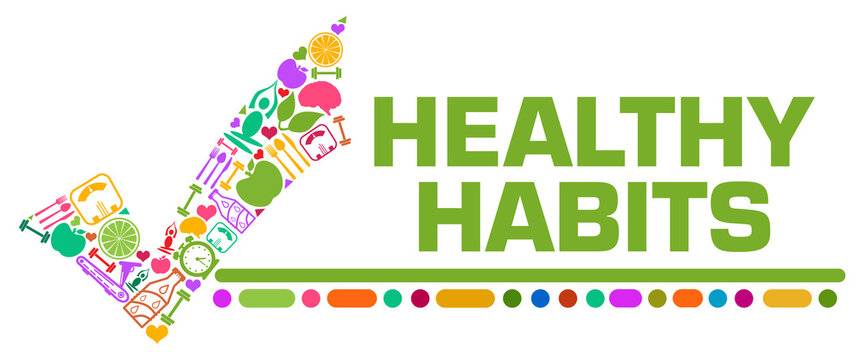20 HEALTHY HABITS | GREAT LIFE IN GOOD HEALTH
What are healthy habits and how can helpful in a good healthy life?
A healthy habit is a geste or routine that promotes physical, internal, or emotional well-being and contributes to an existent’s overall health and quality of life. Healthy habits are generally associated with positive life choices and are important for maintaining or perfecting one’s well-being and helping to good health. Some common exemplifications of healthy habits include
1. Regular Exercise in good health Engaging in physical exertion regularly, similar to walking, jogging, swimming, or rehearsing yoga, to maintain or ameliorate physical fitness.
2. Balanced Diet Consuming a variety of nutritional foods, including fruits, vegetables, whole grains, spare proteins, and healthy fats, while moderating the input of reused and unhealthy foods.
3. Acceptable Hydration Drinking sufficient water throughout the day to stay duly doused, which is essential for colorful fleshly functions.
4. Sufficient Sleep icing a harmonious and peaceful sleep routine, generally aiming for 7- 9 hours of sleep per night for grown-ups.
5. Stress operation enforcing stress-reduction ways like contemplation, deep breathing, or awareness to manage and reduce stress.
6. Regular Health Check-ups Scheduling and attending routine medical check-ups and wireworks to cover and maintain physical health.
7. Personal Hygiene rehearsing good hygiene habits, including regular bathing, dental care, and hand washing to help illness and maintain overall health.
8. Limiting Alcohol and Tobacco Reducing or barring the consumption of alcohol and avoiding tobacco use to promote overall health and reduce the threat of habitual conditions.
9. Mental Health Support Seeking professional help or engaging in conditioning that supports internal health, similar to remedy, comforting, or relaxation ways.
10. Positive Social Connections Maintaining healthy and probative connections with family and musketeers to foster emotional well-being and reduce passions of insulation.
11. Time Management Effective time operation to balance work, particular life, and rest conditioning, reducing stress and enhancing productivity.
12. Aware Eating rehearsing aware eating promotes a healthy relationship with food, reduces gluttony, and ameliorates digestion.
13. Regular Physical exertion Incorporating physical exertion into diurnal routines, similar to taking the stairs, walking or cycling rather than driving, and sharing in pursuits that involve movement.
14. Cognitive Stimulation Engaging in conditioning that challenges the mind, like reading, mystifications, or learning new chops, to maintain cognitive health.
15. Environmental mindfulness Making eco-friendly choices to reduce environmental impact, similar to recycling, conserving energy, and reducing waste.
Healthy habits are essential for precluding illness, perfecting overall well-being, and maintaining a high quality of life. espousing and maintaining these habits requires commitment and discipline but can lead to lasting health benefits.
Why is good health important?
Good health is pivotal for a multitude of reasons, as it significantly impacts an existent’s overall well-being, quality of life, and capability to lead a fulfilling and productive life. There are several crucial reasons why good health is important
1. Physical Well-being Good health is the foundation of physical well-being. It allows individuals to have the energy, vitality, and stamina demanded to engage in diurnal conditioning, perform tasks, and enjoy life to the fullest.
2. Life Good health is linked to a longer life expectancy. People with healthy cultures and habits tend to live longer and have a lower threat of habitual conditions.
3. Reduced threat of Illness Maintaining good health helps reduce the threat of colorful ails and conditions, including heart complaints, diabetes, cancer, and contagious conditions.
4. Improved Quality of Life Good health enhances the quality of life by enabling individuals to share in conditioning they enjoy, spend time with loved ones and pursue their pretensions and heartstrings.
5. Mental and Emotional Well-being Physical health is nearly connected to internal and emotional well-being. Good health supports emotional adaptability, reduces the threat of internal health issues, and contributes to a positive outlook on life.
6. Productivity Good health leads to increased productivity, both at work and in diurnal life. When individuals are healthy, they can concentrate on tasks, break problems, and achieve their pretensions more effectively.
7. Reduced Healthcare Costs Maintaining good health and precluding illness can lead to lower healthcare costs, as individualities may bear smaller croaker visits, specifics, and treatments.
8. Independence Good health supports independence, allowing individuals to watch for themselves and maintain their diurnal routines without counting on others.
9. Strong Immune System A healthy body has a stronger vulnerable system, making it more able to defend against infections and conditions.
10. Social Well-being Good health facilitates social relations, connections, and a sense of belonging. It allows individuals to share in social conditioning, connect with others, and maintain fulfilling connections.
11. Cognitive Function Good health is essential for optimal cognitive function. It promotes memory, attention, and internal clarity.
12. Prevention of Lifestyle conditions Healthy lifestyle choices, similar to a balanced diet, regular exercise, and stress operation, can help with life-related conditions like rotundity and type 2 diabetes.
13. Environmental Impact Good health practices frequently align with eco-friendly choices, contributing to environmental sustainability and reducing the existence’s ecological footmark.
14. Happiness and Satisfaction Good health is nearly linked to happiness and life satisfaction. Feeling well physically and emotionally contributes to an overall sense of pleasure.
15. Financial Well-being Good health can lead to fiscal well-being by reducing healthcare costs and enabling individuals to work and earn income.
What are the 20 healthy habits in good health?
Healthy habits are essential for good physical, internal, and emotional health. Then are 20 healthy habits that can contribute to a well-rounded and fulfilling life
1. Regular Exercise Engage in physical exertion, similar to walking, jogging, cycling, or yoga, to promote cardiovascular health and maintain physical fitness.
2. Balanced Diet Consume a variety of nutritional foods, including fruits, vegetables, whole grains, spare proteins, and healthy fats, while moderating the input of reused and unhealthy foods.
3. Acceptable Hydration Drink sufficient water throughout the day to stay duly doused, which is essential for colorful fleshly functions.
4. Sufficient Sleep Aim for 7- 9 hours of quality sleep each night to support physical and internal health.
5. Stress operation Practice stress-reduction ways similar to contemplation, deep breathing, awareness, or pursuits that promote relaxation.
6. Regular Health Check-ups Schedule and attend routine medical check-ups and wireworks to cover and maintain physical health.
7. Personal Hygiene Maintain good hygiene habits, including regular bathing, dental care, and hand washing to help illness and maintain overall health.
8. Limit Alcohol and Tobacco Reduce or exclude the consumption of alcohol and avoid tobacco use to promote overall health and reduce the threat of habitual conditions.
9. Mental Health Support Seek professional help or engage in conditioning that supports internal health, similar to remedy, comforting, or relaxation ways.
10. Positive Social Connections Maintain healthy and probative connections with family and musketeers to foster emotional well-being and reduce passions of insulation.
11. Time Management Practice effective time operation to balance work, particular life, and rest conditioning, reducing stress and enhancing productivity.
12. Aware Eating Practice aware eating promotes a healthy relationship with food, reduces gluttony, and ameliorates digestion.
13. Regular Physical exertion Incorporate physical exertion into diurnal routines, similar to taking the stairs, walking or cycling rather than driving, and sharing in pursuits that involve movement.
14. Cognitive Stimulation Engage in conditioning that challenges the mind, like reading, mystifications, or learning new chops, to maintain cognitive health.
15. Environmental mindfulness Make eco-friendly choices to reduce environmental impact, similar as recycling, conserving energy, and reducing waste.
16. Gratitude and Positivity Cultivate a positive outlook by rehearsing gratefulness and fastening on the bright side of life.
17. Sun Protection Use sunscreen and defensive apparel to shield your skin from dangerous UV shafts and reduce the threat of skin cancer and unseasonable aging.
18. Regular Dental Care Visit the dentist for regular check- ups and maintain proper oral hygiene to help with dental issues.
19. Declutter and Organize Decluttering your living space can reduce stress and ameliorate overall well-being.
20. Lifelong literacy Continuously pursue new knowledge and chops to keep the mind engaged and maintain intellectual curiosity.
These healthy habits, when incorporated into your diurnal routine, can help you achieve and maintain optimal well-being. Flashback that everyone’s requirements and circumstances are different, so it’s essential to knit these habits to fit your pretensions and life.
What’s a healthy habit for kiddies?
Healthy habits for kiddies are essential for their physical and internal development, and they lay the foundation for a continuance of well-being. Encouraging children to adopt healthy habits from an early age can help maintain habitual conditions, promote strong physical health, and support their emotional and social growth. Then are some healthy habits for kiddies
1. Balanced Diet Encourage children to eat a variety of nutritional foods, including fruits, vegetables, whole grains, spare proteins, and low-fat dairy products. Limit their consumption of sticky snacks, fast food, and sticky drinks.
2. Regular refections Promote a regular mess schedule with breakfast, lunch, and regale to give essential nutrients and maintain energy situations.
3. Hydration ensures kiddies drink enough water throughout the day to stay doused and support overall health.
4. Physical exertion Encourage regular physical exertion through play, sports, and recreational conditioning. Aim for at least 60 twinkles of physical exertion each day.
5. Acceptable Sleep Establish a harmonious bedtime routine to ensure kiddies get enough sleep, which is vital for their growth, cognitive function, and emotional well-being.
6. Hand wash is a health habit that leads to Educate proper hand washing ways to help the spread of origins and reduce the threat of illness.
7. Dental Care Promote regular dental check-ups and emphasize good oral hygiene habits like brushing and flossing.
8. Safety Habits Educate children on safety rules, including wearing helmets when biking, using seatbelts, and following business rules.
9. Positive Social relations Encourage kiddies to interact with peers and family members, fostering healthy social connections and emotional development.
10. Reading Read with your child regularly to develop knowledge chops, stimulate imagination, and encourage a love of literacy.
11. Emotional Health Educate kiddies about managing feelings, expressing passions, and seeking support when demanded.
12. Outdoor Play Encourage out-of-door play and discourse to promote physical health and a connection with nature.
13. Awareness Introduce simple awareness practices to help kiddies manage stress and anxiety.
14. Responsibility Educate kiddies on responsibility by involving them in age-appropriate chores and tasks at home.
15. Healthy Snacks gives nutritional snacks like fruits, vegetables, and whole-grain options to support healthy eating habits.
16. Cultural Awareness Promote artistic mindfulness and acceptance of diversity to foster open-mindedness and forbearance.
17. Gratitude Encourage kiddies to express gratefulness and appreciate the positive aspects of their lives.
18. Environmental Stewardship Educate kiddies about the significance of minding for the terrain through conditioning like recycling and reducing waste.
19. Limit Sugary Drinks Limit the consumption of sticky potables like soda pop and fruit authorities, which can contribute to dental problems and redundant sugar input.
20. Safety in Water Educate children on water safety rules and ensure they’re supervised when swimming or near bodies of water.
21. Bike Safety Educate kiddies on bike safety rules, including wearing helmets, following business signals, and riding in designated areas.
22. Healthy cuisine Involve children in mess medication and cuisine to educate them about healthy food choices and culinary chops.
23. Regular Health Check-ups Schedule and attend regular pediatric check-ups and vaccinations to cover children’s physical health.
24. Limit Fast Food Minimize fast food consumption and conclude for healthier manual druthers.






3 Comments